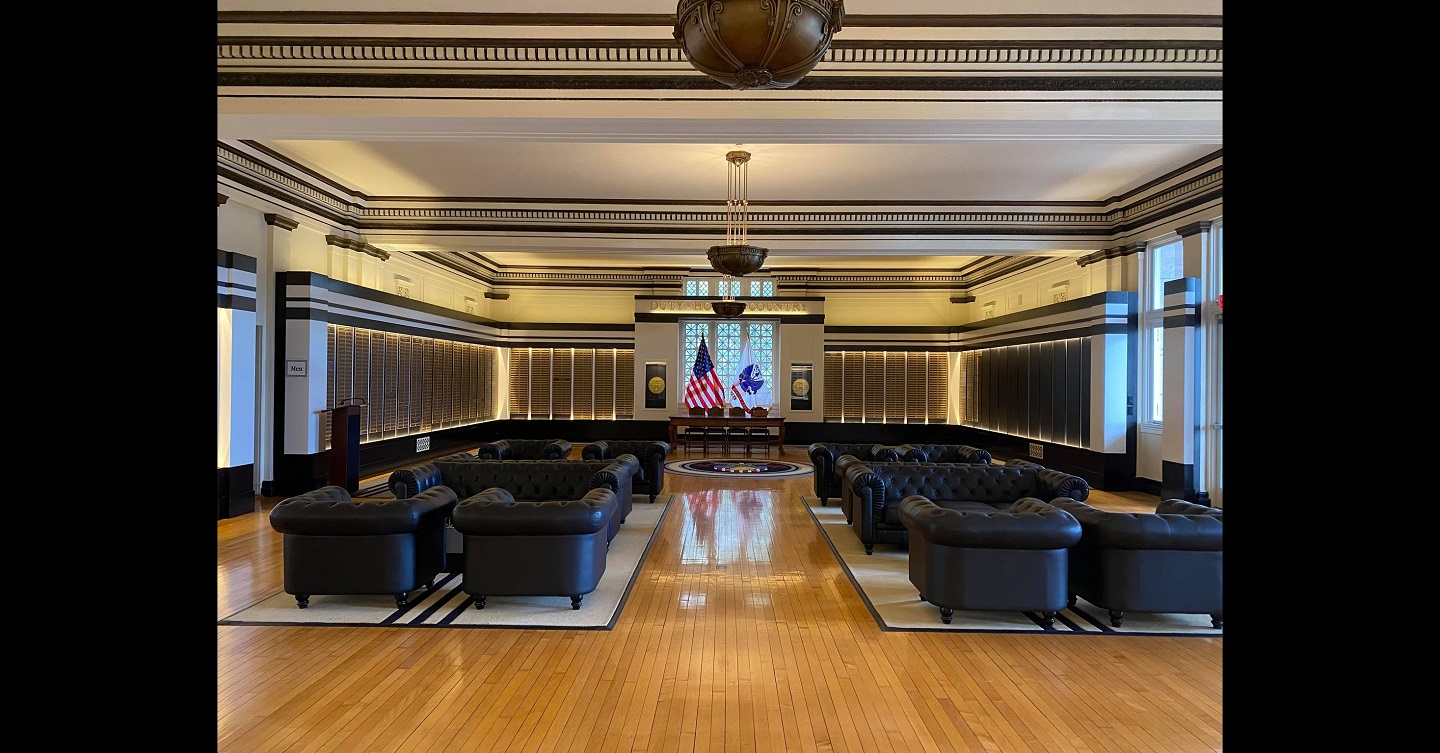
“As a soldier, which war would you be proud to have your name affiliated with?”
The U.S. Military Academy at West Point, N.Y. is home to an ornate building with a memorial room, dedicated to graduates who died in service to the nation. Plaques memorializing its wars line three walls, beginning with the War of 1812. Beneath each marker descend the names of that war’s deceased. New ones are added from time to time, because of the ongoing Global War on Terror. A class recently met in this room, and there a cadet posed a deeply philosophical question: “As a soldier, which war would you be proud to have your name affiliated with?”
The simplicity of the question juxtaposed with the depth of the answer is striking. The question itself implies agency. Agency leads to a question of control. In this context – the quintessential control – that of the relationship between the military and those elected and appointed to lead the nation. As the United States extricates itself from the war in Afghanistan, now is a time for national reflection on such control, and for consideration of how U.S. veterans may one day answer questions about their service in that war.
The United States should ask questions of its own about its control of the war and its military should make a deliberate review of all operational and tactical considerations it took to wage it, to improve upon future performance. And as part of this introspection, both the government and the military should consider service members’ sacrifices, because, according to Audie Murphy, the most decorated veteran of WWII, “no soldier ever really survives a war.”
The war in Afghanistan deserves deep reflection, given its length. For most of today’s military members, war is all they have known. Most of the newest recruits were born into it. They chose to join an Army at war. They chose this war to fight. Despite all the global and domestic changes of the last two decades, the Afghanistan conflict remained constant. This singular fact became the identity of the force. Without this “forever war,” how would the military and its members define themselves?
Should history prove the Global War on Terror a just cause and worthy effort, few will argue against it. However, if the opposite is true, would such an assessment kill Americans’ appetite for future conflicts? Would it shatter trust between the military and its policymakers? Can policymakers look at the names along the U.S. Military Academy’s memorial wall in good conscience? Doing so may be a starting point for their analysis. And at the end of those earlier conflicts, what was the status of our civil-military relations? Was reform necessary? Was America better off?
Regardless of the answers to these questions, the underlying principle of military obedience to civilian control must stand. How then should Americans answer the cadet’s question, if we determine any of our wars was unjust, ineffective, or strategically bankrupt? It is natural for soldiers and citizens alike to question wars’ sacrifices. How well should a democratic society defend its past war declarations to its military before the next conflict? And if justifications are not offered, should armed servants have a larger voice in which wars or military actions they will execute?
The answer is not a clear dichotomy between yes or no. This is also not about Just War theory. Noted scholar, James Burk argues for “responsible obedience to a constitutional principle.” He goes on to explain that this type of obedience “does not preclude debate and reflection…but rather establishes a framework for it.” What matters is the echelon at which these debates occur and at which phase in the policymaking process they occur. Ultimately, military subordination to the civilian government is the form of obedience necessary to maintain healthy civil-military relations. At the end of the process, after senior military leaders have had the opportunity to offer advice, they must carry out all legal civilian orders. This includes orders that historians may disparage. And though the primary responsibility for evaluating the merits of entering any conflict hangs on the representatives of the American people, the electorate must remain engaged and informed, so it can alter the course of a conflict if necessary, when less than one percent of its people still serve.
The Republic must reassure its future warfighters that their causes will be just and necessary for maintaining the American way of life.
Cadets staring at names on a memorial wall must have faith that future conflicts will be worthy of their sacrifice. They must believe their fellow Americans will concern themselves for their military’s efforts. The Republic must reassure its future warfighters that their causes will be just and necessary for maintaining the American way of life. This belief must extend to every member of the military. It must permeate society. Without this, trust cannot exist. That soldiers continued to knowingly sign up for the war against terror is a testament to the enduring loyalty of the defenders to the defended.
Political scientist Samuel Huntington supports that “only rarely will the military man be justified in following the dictates of private conscience against the dual demand of military obedience and state welfare.” Once the political process reaches a decision, soldiers have a duty to prosecute to the utmost of their professional ability the activities selected by civilian leaders. Soldiers are not to evaluate the justness of the cause—or the conduct of the war, or its outcome. Yes, soldiers have a duty to disobey unlawful orders—but, conversely, they must obey all lawful ones, even if history condemns them in time. The stability of the underlying system depends on such obedience.
Critical to this concept of obedience is the political process to determine the policy. Soldiers who will execute orders must have faith that the system to determine their fate is legitimate. The constitutional process and evolution of government decision making allows for and demands checks and balances. All three branches of the U.S. government should play a role. Acquiescence to the Executive branch alone may reduce the legitimacy of the outcome. It may also muzzle the military’s voice, resulting in silent obedience rather than considered orders.
The proper way for senior military leaders to influence the courses of conflicts is through military advice, though this process is rightly constrained. In their advice to civilian leaders, senior officers should not exclude viable options they personally consider unwise or advocate only for the options they think are best. Only civilian leaders get to calculate the risks the nation is willing to take.
Soldiers do not get to choose the war they want to affiliate with. They fulfill their constitutional obligation. They march. It is left to the citizenry to evaluate the choices their elected representatives make. Only they have the constitutional mechanism required to leverage a framework based on history, justice, or morality. It is because of, not despite, this framework, that they can be wrong because legitimacy is derived from the people after all. If there is a chance history will look back on a war or other use of the military and question its merits, perhaps society should ask different questions before orders are given. Ultimately, the military will march, and it will rely on the citizenry and policymakers to answer its question: “Which war did you choose?” Perhaps more importantly they can answer why.
In the United States, it is not up to the Soldier to decide which wars are just; which wars are moral; which wars are necessary. Our system subordinates the military to civilian authority. Healthy civil-military relations dictate only one answer to the cadet’s question: “Any of them.”
Maj. George Fust is an Army officer currently attending the Command and General Staff Officer College. He previously taught in the Social Sciences Department at the U.S. Military Academy at West Point. He holds a master’s degree in political science from Duke University and has published in a variety of sources.
The views expressed in this article are those of the author and do not necessarily reflect those of the U.S. Army War College, Command and General Staff Officer College, the U.S. Army, or the Department of Defense.
Photo Description: U.S. Military Academy, Cullum Memorial Hall, West Point, Orange County, NY
Photo Credit: Courtesy of Debbie Haley





Perhaps one way to consider a soldier’s position in different and difficult circumstances, this is via the lens of the Old Cold War — and the New/Reverse Cold War — that I provide below:
a. In the Old Cold War of Yesterday (1945 – 1990), it was OUR GOAL to prevent the “revolutionary” Soviets/communists from advancing the political, economic, social and value changes that the Soviets/the communists believed that both their own countries — and the world at-large — required. One way that WE did this was by working “by, with and through” OUR “natural allies” in these such “containment” circumstances, to wit: the more-traditional/the more-conservative/the more-no-change (and/or reverse unwanted change) elements of both OUR own, and indeed other, states and societies. (Important to note here OUR efforts to target, and to work more “by, with and through,” the more-traditional/the more-conservative/the more no-change [and/or reverse unwanted change] elements WITHIN THE SOVIET/THE COMMUNIST STATES AND SOCIETIES THEMSELVES.)
b. In the New/Reverse Cold War of Today (1990 – present), it has been THE GOAL OF OUR ADVERSARIES to prevent the “revolutionary” U.S./the West, in this case, from advancing the political, economic, social and value changes that we believe both our own countries — and indeed the world at-large — requires. One way that OUR ADVERSARIES have done this is by working “by, with and through” now THEIR “natural allies” in these such “containment” circumstances, to wit: the more-traditional/the more-conservative/the more-no-change (and/or reverse unwanted change) elements of both THEIR own, and indeed other, states and societies. (Important to note here OUR ADVERSARIES’ efforts, in this case, to target, and to work more “by, with and through,” the more-traditional/the more-conservative/the more no-change [and/or reverse unwanted change] elements WITHIN THE U.S./THE WEST ITSELF.)
“Compounding it all, Russia’s dictator has achieved all of this while creating sympathy in elements of the Right that mirrors the sympathy the Soviet Union achieved in elements of the Left.”
(See the Dec 2016 “National Review” article entitled: “How Russia Wins” by David French.)
Bottom Line Thought — Based on the Above:
If you were a “Liberal”/”Left-leaning” soldier in the Old Cold War of Yesterday, you were still required — to the best of your ability — to do your part to support the U.S./the West’s goal of preventing the Soviets/the communists from advancing the political, economic, social and value changes that they believed that both their own countries — and indeed the world at-large — required. (And, accordingly, you should be proud of your such efforts.)
Likewise if you are a “Conservative”/”Right-leaning” soldier in the New/Reverse Cold War of Today, you are still required — to the best of your ability — to do your part to support the U.S./the West’s goal of advancing the political, economic, social and value changes that, in this case, we believe both our own countries — and indeed the rest of the world — requires. (And, accordingly, you should be proud of your such efforts.)
The problem is, as a former West Point superintendent once wrote is, “The Army corporate memory was (is) little more than one generation long, stretching back no farther that the experiences of the men in it.”
Our experiences in Vietnam were germane, but little evidenced in the wars that followed.